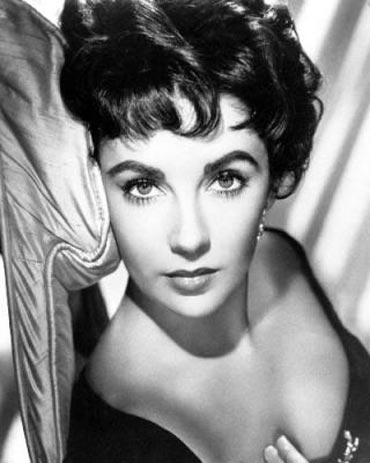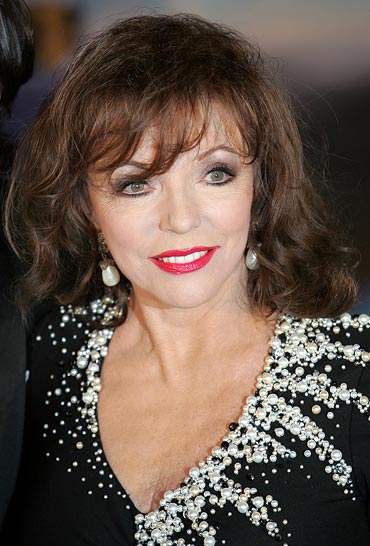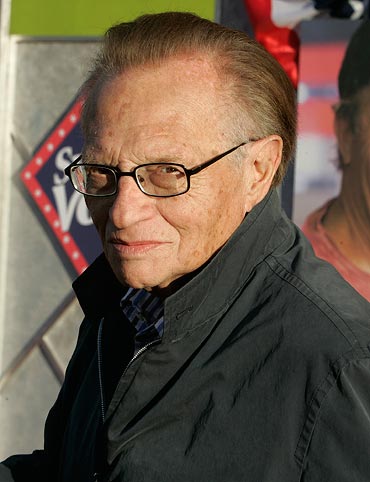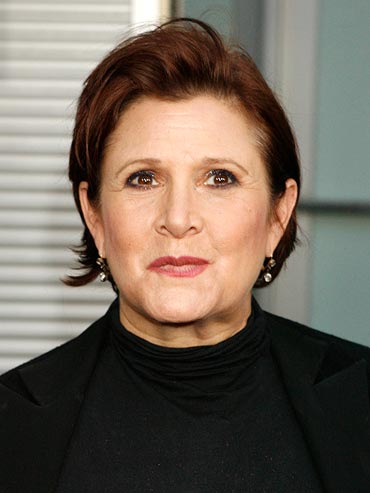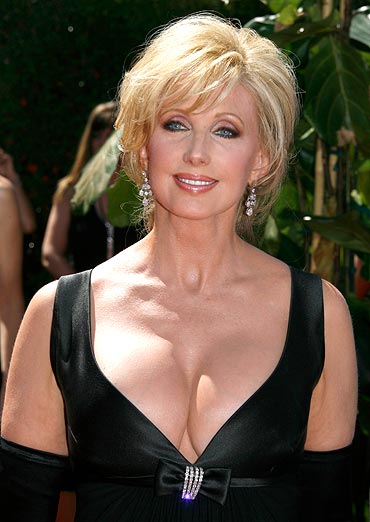 | « Back to article | Print this article |
'We'll never see her likes again. Never'
CNN International's PIERS MORGAN TONIGHT saluted Elizabeth Taylor who passed into the ages on Wednesday.
Excerpts from the programme:
Piers Morgan, Host: Tonight Hollywood and the world are remembering a woman who defined screen glamour for several generations, Dame Elizabeth Taylor.
I'll talk to her friends and family, the people who knew the private Elizabeth, the woman behind the legend. We begin with Carol Bayer Sager, the Oscar-winning songwriter of classics like That's What Friends are For. She was a close friend of Elizabeth's for many years and she's at her bedside when she sadly passed away today.
Carol, what were your feelings today when Dame Elizabeth finally died. She's been ill for a long time. It must have been, I guess, a bittersweet moment, a relief that she was no longer in pain.
Carole Bayer Sager, Songwriter: Yes, and I mean, I went there last night to say good-bye and I knew she was going, and I hated that she'd been in hospital for seven weeks, but she wasn't in pain last night. And she wasn't really conscious when I saw her, but I was there with Liza and Maria, her -- two of her daughters and -- her two daughters, and I was able to say good-bye.
And what I want to say, Piers, is that she was an extraordinary friend, and not just for the good times, Elizabeth showed up. She showed up in my life when my marriage broke up many years ago and -- to Burt Bacharach. She was there.
She's there for her friends, for her family, her assistant Tim who's been with her for 20 years when his mother died this year. She insisted that she come and stay at her home and she made a hospice for Tim's mom.
And she made a hospice for her longtime publicist Chen Sam who died a number of years ago and she died in Elizabeth's home. She was there for Roddy McDowall who she loved dearly. They were child actors together. And she held him in her arms and she knew how to show up.
She showed up for Michael Jackson when he needed support. She flew across the world to be with him years before the big case, the incident before that. I mean, she was an extraordinary, loving, generous friend.
Morgan: Carol, how was she towards the end of your life, do you think? I got a sense of frustration about getting old and being so frail and ill all the time.
Sager: I don't think it was about getting old. I don't think Elizabeth feared getting old.
I think it was not being fully vital. I -- she was in a wheelchair for the last few years of her life and then this year she fractured both of her knees and literally had to be carried out of the wheelchair and out of the hospital bed.
So her life -- she couldn't do the things -- I mean she did. She was so brave. That's another thing I want to say.
She was so brave because most of her life she endured chronic back pain and she brought all this light and love and generosity to this world in spite of the fact that often she was in pain.
And I think the last few years in -- this is just my feeling -- didn't bring her as much joy because her body was failing and she wasn't, her spirit wasn't, but her body was, and it had lived a lot and suffered a lot.
'I always called her Elizabeth because she didn't like being called Liz'
Morgan: Joan Collins joins me now.
Joan, you have an interesting history with Elizabeth Taylor because, of course she got this great role Cleopatra and you were in the running for that role.
Joan Collins, Actress: Yes, Piers, I was, and I was under contract to 20th Century FOX when they decided to make Cleopatra, and I did several tests with several actors who -- well, to say that they were wooden would be unkind to trees. They didn't bring out the big guns for my tests.
And anyway, it got to the point where they were building the sets and it became very, very expensive and they decided that they didn't want little old me because I wasn't a big enough star, so they would go for -- you know, the top female of the time, female actress of the time, and that was Elizabeth, and they went to her and they offered her $1 million -- no, they didn't offer her $1 million.
She said she would do it for $1 million. She was the first million-dollar actress. And this was I think 1962, so she did it and I didn't get the part but about a year later I'm lying in bed, my agent Jay Kantor calls me and said, stand by to get on the next plain to London.
I said, why? What's happened? He said Elizabeth is very, very sick, they think she's going to die. She's in the hospital in London and they want you to take over as Cleopatra.
I said, I -- I can't do that. She's a friend of mine. I would feel absolutely dreadful to do that if she's going to die that I'm going to go over and take her role as Cleopatra. He said, listen, this is showbiz, kid, you wait -- wait by the phone, do not move.
Well, of course, there's no cell phones on those days, so I sat by the phone all day biting my nails and hoping that she would get better and, of course, she did get better as we all know, and I didn't get Cleopatra. But she got Richard Burton which is another story.
Morgan: And apart from great acting you also shared, of course, a penchant for men and husbands, Joan. I hope you don't mind me saying that. You have 13 between you.
Collins: Oh no. That's true and, in fact, the last time that I got a divorce, she sent me a note and she said, I'm still ahead by three.
Collins: I said -- I sent one back saying, don't worry, Liz, I'm going to catch up.
Collins: And, Liz -- I actually didn't call her Liz. I always called her Elizabeth because she didn't like being called Liz, and -- so I think people have a huge amount of respect for her.
And the thing that was so amazing about her is that most women really liked her.
She was a gal's gal, you know. Like Carol just said, she was so one of the girls and people like and, of course, men just fell all over themselves for her.
'There's no one who could step in Elizabeth's shoes'
Morgan: And I want to bring in someone who interviewed Elizabeth Taylor more than anybody else, my predecessor, Larry King.
Larry, it must be a very sad day for you. You knew Liz Taylor probably better than most people.
Larry King, Former Host, Cnn's Larry King Live: She was so giving and when she supported you -- if she liked you -- you had no better friend. There's a lot of comparisons to Sinatra and her, both icons, both said whatever they thought, didn't care what the press thought about them, when they stood up for you they stood up for you.
Morgan: Larry, what do you think made her such a great star? I saw today that you said earlier in your view she was possibly the last of the great, great stars. What made her that?
King: Piers, you've never seen eyes like Elizabeth Taylor's. They were violet. They were deep violet. She was a tiny woman. She was not tall at all. Tiny.
But she had a face -- it went right through you so she had that. She had a magnificent presence and that last -- and when you say she was the last, she was the last.
There's no one could step in her shoes. We -- I was talking to today someone, I couldn't think of anyone in the film industry today who could sadly pass away, let's say -- pick anyone -- who would have the attention she is getting today around the world.
Morgan: What was she like away from the cameras, Larry? What was she like?
King: Same as she was on camera. She told you what she thought. She was fun to be with. She was -- as Joan said she was very funny. She had a great sense of humor. A great sense of herself and what she wanted.
She was so -- you know a word that fits her? Passion. She was passionate about everything.
She just soaked it up. She soaked up the room. She changed the room when she walked in it. We'll never see her likes again. Never.
'She had a great, great sense of humour'
Carrie Fisher, Elizabeth Taylor's Stepdaughter: Very sad. Especially -- I mean I lost my father this year, and not that many months ago, and actually I called Elizabeth to tell her when he passed and she cried.
Morgan: Did she really?
C Fisher: Which I thought was incredibly sweet. I mean she had really a sense of family even -- bizarre -- you know someone that she had been married to so long ago.
Morgan: And what kind of person was Elizabeth Taylor away from the glare of the media coverage? What was the real Elizabethlike, do you think?
C Fisher: Well, to me she really -- she really -- she really loved a good time. She -- I remember one time she pushed me in the pool after establishing that I wouldn't pull her in afterwards and she used to have these egg hunts at her house for all the children and she seemed to love doing stuff like that.
And she -- she just one night I went on -- we went on a double date. It was Elizabeth and Michael Jackson, and Shirley MacLaine and myself.
Morgan: Wow.
C Fisher: And it was like -- no one noticed Shirley and I.
Morgan: Your father and Elizabeth famously didn't speak for nearly 40 years until 2007 but your mother Debbie Reynolds said that she spoke to her just two weeks ago and they had a very good conversation.
C Fisher: No, yes, she -- well, yes, I mean my mother said, you know, Elizabeth wasn't feeling that well and I think like Carol said, she just -- you know, she was someone who really enjoyed having a vital life, and you know, to be sort of bedridden like that, I don't -- I think she'd rather be in bed another way.
Morgan: Carrie, there's something absolutely mesmeric about Elizabeth Taylor on screen.
What was your impression of her as an actress?
C Fisher: Well, I mean she glowed. I mean if she was on screen, you didn't look at anyone else.
Morgan: How would you like to remember her, Carrie? How would you like the world to remember Elizabeth Taylor?
C Fisher: She was this incredibly vital -- and she had a great, great sense of humour. And I think, you know, that's something that I don't think people saw enough of with her.
'She was the most gorgeous woman I have ever seen in person'
Morgan: Actress Morgan Fairchild worked with her on a television miniseries North and South. And Dick Cavett got to know her very well over the years.
Dick, what's your favorite memory of Elizabeth Taylor?
Dick Cavett, Author, Former Radio Talk Show Host: My favorite memory is totally unlikely. I was doing my magic act some years ago at a big party. And I thought I saw someone in the audience who looked like Elizabeth Taylor. And as I was cutting my rope trick, doing my rope -- I said I've had this dream that Elizabeth Taylor would come up and help me.
And this lighting beauty of a figure came up. And Elizabeth Taylor was standing there. And I didn't know what to do. I got off a dreadful joke. She had to cut the rope seven or eight times and she had a little trouble. I said just think of it as the marital knot. And I heard later that she found that funny, but didn't let me know at the time.
But she -- she was everything they say. It's a crime she did not write a book on her mastery of screen acting. She just knew it all, and probably had -- knew more than ten other actors have forgotten. Burton, on a show of mine, once talked about how generous she was in teaching him things that he didn't know. Imagine.
And she was heroic in her illnesses. And she was fabulous with the AIDS thing when it was not to her advantage to be so, when the idiots who were in power.
And it was just on that subject -- and she was very energetic. She had a gutsy laugh, a great sense of humor. Once at a thing she was standing talking with a bunch of stagehands at a benefit. And they said -- one of them said I understand you have not been feeling well, Miss Taylor. How do you feel now? And she said as good as you can with diarrhea.
Morgan: Morgan, What was it about her that set her apart? Because there's no doubt that there's a lot of truth to this feeling today, I think, that in terms of the global impact of her death, Elizabeth Taylor was probably the last of the great movie stars. Why?
Morgan Fairchild, Actress: You know, Piers, there was just something so special about her. Having grown up watching her movies, it was, as Carey said, she had that star quality. When she was on the screen, you couldn't see anything else. You couldn't take your eyes off of her.
Of course, the scandals, the marriages, all of those things sort of loaded up on it, too. But there was always that magnificent screen presence, a total professional, a funny lady, a nice lady, a down-to- Earth lady, who had her own share of problems, which sort of -- in a way, those vulnerabilities made the public care more about her, I think.
The fact that she did have weight problems, that she did have sometimes the alcohol problems, that she had these different foibles in her life, and yet seemed to rise above it.
She took it all with great equanimity. And she was lovely to be around on the set. I didn't actually have scenes with her, so I didn't get to work with her. But I always remember the first time I ever saw her.
Burton was doing Equus on Broadway, and I had gone to see it. And the murmur went through that Elizabeth was in the audience.
You're looking and looking. And finally I saw this turban. She was wearing turbans a lot back in the '70s. And she turned and that face -- I have to say, she was the most gorgeous woman I have ever seen in person.
The screen did not do her justice. Just gorgeous, gorgeous coloring, the profile. Everything about her was just drop-dead gorgeous.
